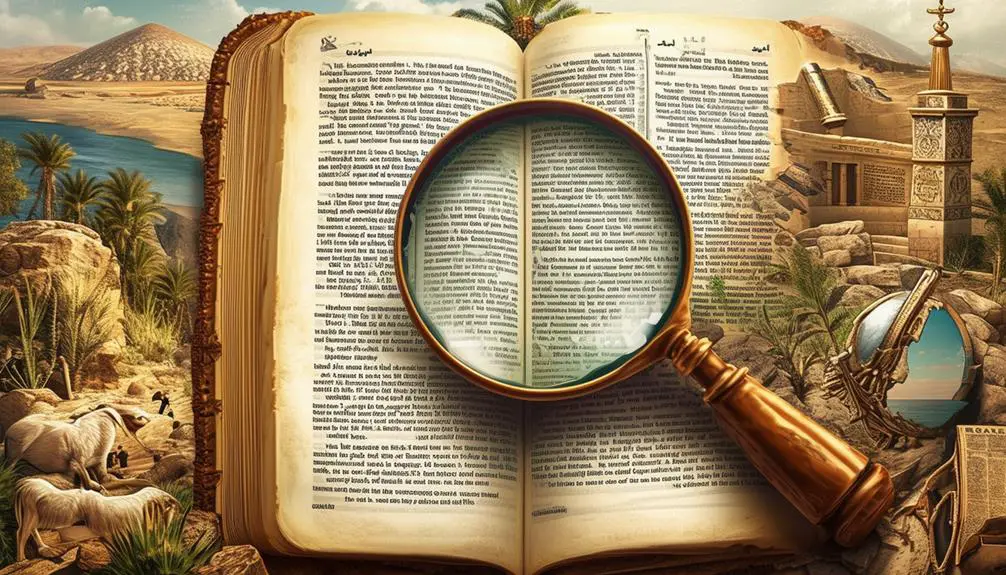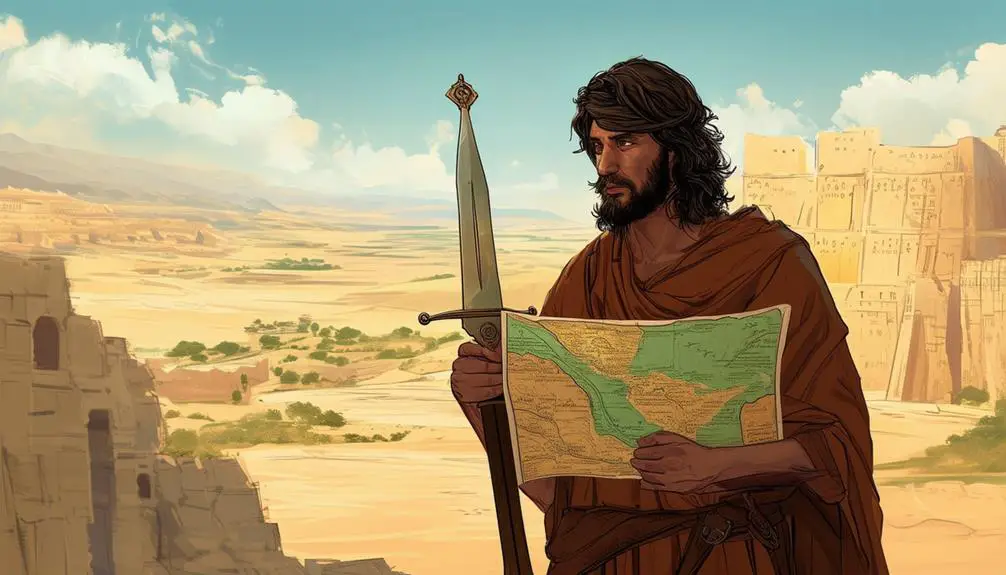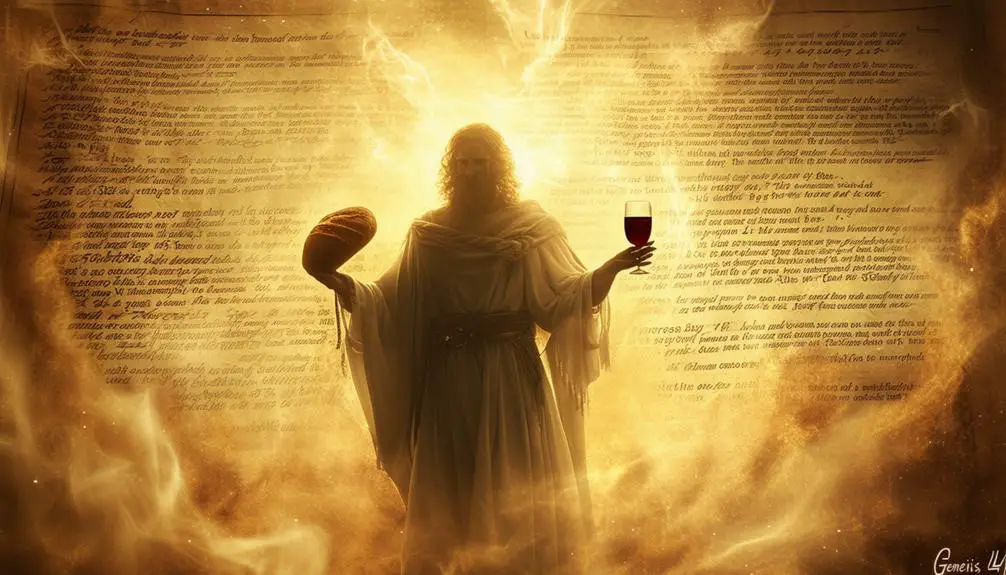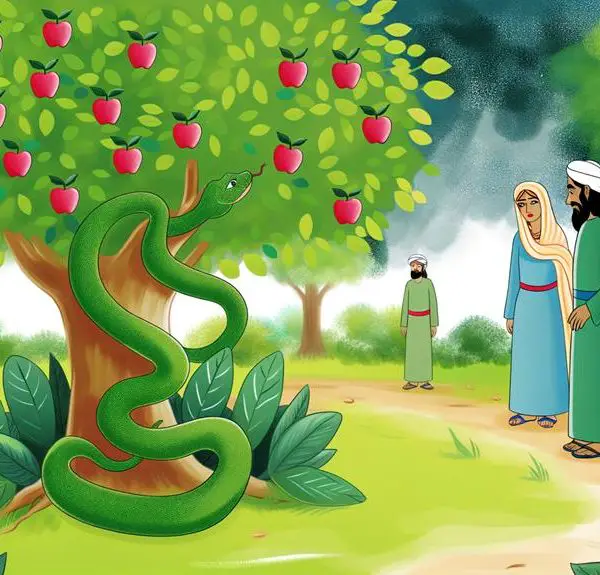Mysteries unfold in Genesis 14, as Abram's valor meets Melchizedek's enigma, promising a deeper understanding of faith, obedience, and divine intervention.

Bible Study – The Book of Genesis – Chapter 14 – Summary and Analysis
In Genesis 14, you encounter warfare, alliances, and the mysterious figure of Melchizedek. It's a significant chapter marking Abram's bravery and leadership. Nine kings disrupt the geopolitical landscape in a high-stakes conflict, where Abram shines. However, it's the puzzling Melchizedek, King of Salem, who brings a novel twist. His blessing of Abram post-victory carries substantial theological weight. This chapter stimulates reflection on themes like faith, obedience, and divine intervention. As you further explore, anticipate gaining fresh insights and deeper understanding of God's word.
Key Takeaways
- Genesis 14 describes a complex narrative of warfare, political alliances, and the intriguing appearance of Melchizedek, a king and priest.
- Abraham's faith and leadership are illustrated in his strategic victory in the Battle of Nine Kings, showcasing divine intervention.
- The sudden emergence of Melchizedek after Abraham's victory brings theological depth, with his blessing of Abraham symbolizing God's dominion.
- Melchizedek's unique priesthood, being without lineage and eternal, along with his kingly attributes, foreshadows Christ's dual role in biblical theology.
- Spiritual lessons in Genesis 14 include the importance of faith endurance, divine intervention, gratitude towards God, and understanding His word.
Genesis Chapter 14 Overview

Diving into Genesis Chapter 14, you'll find a detailed narrative filled with warfare, alliances, and the intriguing character of Melchizedek, all of which require a thorough, scholarly examination to fully understand. The chapter themes echo with political struggles, battles of power, and divine intervention, enriching the tapestry of the biblical narrative.
In the Genesis Significance, Chapter 14 stands as a pivotal moment in the narrative. The chapter showcases Abram's bravery as he rescues his nephew Lot from the four kings. This act not only highlights the theme of loyalty and courage but also establishes the supremacy of God as the ultimate sovereign. It's in this chapter that we're first introduced to Melchizedek, the king of Salem, who is also a priest of God Most High. His appearance, brief yet profound, symbolizes the universal acknowledgment of God's dominion.
The richness of these themes is more than a mere historical chronicle; they form a part of the spiritual legacy of the Abrahamic faiths. Therefore, Genesis Chapter 14 holds deep theological importance, and its detailed study can offer you a wealth of insights into the enigmatic world of ancient biblical narratives.
Historical Context Analysis
To fully understand the depth of Genesis Chapter 14, you'll need to explore the historical context that shapes its narrative. Genesis 14 is set in a period of ancient history marked by significant cultural influences and a distinct geographical relevance, both of which play a critical role in shaping the events and actions depicted in this chapter.
Let's investigate the historical context through the lens of:
- Cultural Influences: The cultural norms of this period greatly influence the interactions among different characters. For instance, the concept of 'might is right' is prevalent, with kings exercising absolute authority and power.
- Geographical Relevance: The locations mentioned, such as Sodom and Gomorrah, have significant historical and religious associations. Their geographical settings provide a backdrop to the unfolding drama.
- Historical Figures: The presence of real historical figures like King Chedorlaomer adds authenticity to the narrative and links it to the wider ancient world.
- Social Structures: The social hierarchy, including the roles of kings, priests, and ordinary citizens, reflect the societal structures of the time.
This historical analysis will enable you to gain an in-depth understanding of Genesis 14, enriching your reading experience.
Abram's Role and Actions

Now that we've explored the historical context, let's shift our focus to Abram, a key figure in Genesis 14, whose actions and role markedly shape the narrative's progression. Abram's faith and unwavering devotion to the covenant promise are at the forefront of this chapter.
Reflecting on Abram's faith, we see his trust in God's promise, even amidst uncertainty and danger. His action to rescue Lot, despite the risks, exemplifies his faith. This act, rooted in personal compassion and divine obedience, reinforces the covenant promise.
Let's dig deeper into the facets of Abram's role with this table:
Aspect |
Description |
Impact |
|---|---|---|
Faith |
Unwavering belief in God |
Sets the foundation of his actions |
Obedience |
Follows God's command |
Reinforces the covenant promise |
Compassion |
Rescues Lot despite risks |
Shows personal virtue |
Leadership |
Leads his trained men in a rescue |
Exhibits strategic and moral leadership |
Covenant Keeper |
Upholds his end of God's promise |
Solidifies his relationship with God |
The Battle of Nine Kings
In examining the Battle of Nine Kings, you will encounter a significant conflict that dramatically impacts the biblical narrative. This event's underlying intricacies and its subsequent implications both offer profound insights into the complex socio-political dynamics of the time. As you analyze these points, you'll gain deeper understanding of the motivations, alliances, and outcomes that shaped this pivotal moment in Genesis.
Nine Kings Conflict
Diving into the heart of Genesis 14, you're immediately confronted with a complex conflict involving nine kings, a pivotal event that greatly impacts the narrative trajectory. This conflict, laden with intricate Kingdom Strategies and War Diplomacy, offers a rich analysis platform.
- Kingdom Strategies: The alliances forged and the decisions made reveal a critical understanding of kingdom strategies during this period.
- War Diplomacy: The interwoven narratives showcase an early form of war diplomacy, with kings seeking allies to strengthen their position.
- Conflict Outcome: The outcome of this conflict sets the stage for Abram's emergence as a key figure.
- Abram's Role: Abram's role in this conflict solidifies his position and establishes his reputation.
This conflict, therefore, isn't just a historical event, but a crucial turning point in Genesis.
Implications of the Battle
Having explored the conflict of the nine kings, let's now turn our attention to the implications of this battle, particularly how it reshaped the geopolitical landscape of the time. The war consequences were far-reaching, altering power dynamics and sowing political intrigue. The victorious four kings, led by Chedorlaomer, expanded their territorial dominion, leading to shifting alliances and power struggles. This war also highlighted the strategic importance of the Jordan Valley and its fertile lands, which became a coveted prize among the regional powers. Amidst this tumult, Abram emerged as a significant player, his military success against Chedorlaomer elevating him in the eyes of the local chieftains. Therefore, this battle had significant implications, transforming the political landscape and setting the stage for future biblical narratives.
Melchizedek's Mysterious Appearance

You're now exploring the enigmatic figure of Melchizedek who appears mysteriously in Genesis 14. As you examine his revealed identity, you'll consider the significance of his blessing to Abraham and the pivotal role he plays in the narrative. It's important to grasp these aspects in order to fully comprehend Melchizedek's purpose and impact within the context of Genesis.
Melchizedek's Identity Unveiled
Peeling back the layers of Genesis 14, we're confronted with the enigmatic figure of Melchizedek, a character whose sudden appearance and sparse backstory invite much scholarly debate and interpretation. This figure is complex, and as we explore his identity, we'll focus on two key areas: Melchizedek's priesthood and Melchizedek's lineage.
- Melchizedek's Priesthood: He's described as the 'king of Salem' and 'priest of God Most High'. This dual role is unique, signifying his significant position.
- Melchizedek's Lineage: The Bible provides no genealogy for him, making his origins as mysterious as his role.
- Melchizedek's Name: His name meaning 'king of righteousness' further adds to his enigmatic persona.
- Melchizedek's Significance: His sudden emergence at an important juncture in Abram's journey speaks to his importance in biblical narrative.
In essence, Melchizedek's identity is a tapestry of intrigue, mystery, and theological significance.
Significance of Melchizedek's Blessing
Exploring the importance of Melchizedek's blessing, it is crucial to acknowledge his mysterious appearance right after Abram's victorious battle, an event that underscores his pivotal role in the biblical narrative. Melchizedek's Priesthood, unique in its divine appointment, signifies a higher spiritual authority. His blessing of Abram, hence, carries profound theological weight.
In the context of biblical symbolism, Melchizedek's blessing of Abram with bread and wine foreshadows the Last Supper in the New Scriptures. This act reinforces his status as a priest of the Most High God, establishing a spiritual connection between the Old and New Scriptures. As a result, Melchizedek's blessing not only validates Abram's victory but also signifies a divine endorsement of his mission, setting the stage for the unfolding of God's grand salvific plan.
Melchizedek's Role in Genesis
Diving into the narrative's depths, it's striking to note the enigmatic nature of Melchizedek's appearance in Genesis, highlighting his key role in the unfolding biblical story. This mysterious figure, mentioned briefly in Genesis 14, has profound implications, embodying both kingly attributes and a unique priesthood.
- Melchizedek's Priesthood: Unlike other priests, Melchizedek's role isn't inherited or designated; it's seemingly eternal and without lineage.
- Kingly Attributes: He is not just a priest but a king—a dual role that foreshadows Christ's position.
- Blessing of Abraham: Melchizedek's blessing carries weight and significance, demonstrating his high status.
- Tithes: Abraham's tithe to him underscores his respect and recognition of Melchizedek's authority.
In these aspects, Melchizedek's brief appearance serves as a critical theological touchstone, setting the stage for later biblical developments.
Spiritual Lessons and Insights

Often, when you explore the depths of Genesis Chapter 14, numerous spiritual lessons and insights emerge that can profoundly impact your understanding of the scripture. One of the most striking themes is divine intervention, a concept beautifully illustrated through Abraham's narrative. God's intervention in Abraham's circumstances, particularly his victory in the war against the four kings, underscores the divine power that guides and supports those who follow His path.
This chapter also introduces the concept of faith endurance. Abraham, despite the seemingly insurmountable odds, did not falter in his faith. His unwavering belief in God's promise to protect and bless him, even amidst the turmoil of war, is a confirmation of the strength of enduring faith. It's a powerful reminder that faith shouldn't be contingent on circumstances but should remain steadfast regardless.
Moreover, the introduction of Melchizedek, a king and priest, provides insight into the significance of gratitude and reverence towards God. His blessing of Abraham and his offering of bread and wine, symbols of God's covenant, highlight the importance of acknowledging God's divine intervention and maintaining faith.
Analyzing these spiritual lessons and insights will deepen your understanding of God's word and its application in your life.
Frequently Asked Questions
What Is the Relevance of Genesis Chapter 14 to Todays Christian Life?
In Genesis 14, you'll find relevant life lessons such as handling faith challenges and recognizing divine intervention. It's a reminder that, just like Abraham, you're not alone in your struggles. God is always ready to intervene in your situation. The chapter also shows the importance of loyalty and courage in the face of adversity. These are key aspects in today's Christian life, shaping your character and faith journey.
Are There Any Archaeological Findings That Support the Events of Genesis Chapter 14?
You're likely pondering the historical accuracy of Genesis 14. Do any artifacts support it? Indeed, evidence is elusive, and archaeology doesn't conclusively verify these specific events. However, it does affirm the existence of many locations, people, and cultures mentioned. So, while you won't find 'Genesis 14 artifacts' per se, don't dismiss the Bible's historical context. It's a complex puzzle, with pieces still being discovered and interpreted.
How Does Genesis Chapter 14 Contribute to the Overall Narrative of the Bible?
Genesis 14 contributes to the Bible's overall narrative by showcasing Abrahamic leadership. When Lot's captured, you see Abraham's faithfulness and bravery as he risks everything to rescue his nephew. It's here you get a glimpse of Abraham's character, his selflessness, and his unwavering devotion to family. This chapter emphasizes the importance of faith, loyalty, and leadership, all vital themes that run throughout the Bible.
What Are the Different Interpretations of Melchizedeks Appearance in Genesis Chapter 14?
Ever puzzled over Melchizedek's identity in Genesis 14? Some interpret him as a pre-incarnate Christ, while others view him as a historic king with priestly symbolism. You'll find scholars arguing for a theophany, or a divine representation. Yet, others assert he's a heavenly being, not unlike an angel. This enigmatic figure certainly stirs debate, leaving you to ponder the endless possibilities of his true nature.
Who Were the Nine Kings Involved in the Battle Mentioned in Genesis Chapter 14?
In Genesis 14, you'll encounter a war involving nine kings. These leaders and their kingdom alliances deeply impact the narrative. Analyzing their war strategies, you'll find four kings: Amraphel of Shinar, Arioch of Ellasar, Chedorlaomer of Elam, Tidal of Goiim, against five: Bera of Sodom, Birsha of Gomorrah, Shinab of Admah, Shemeber of Zeboiim, and the king of Bela. Their interactions provide key insights into the historical and spiritual context of this chapter.



Sign up